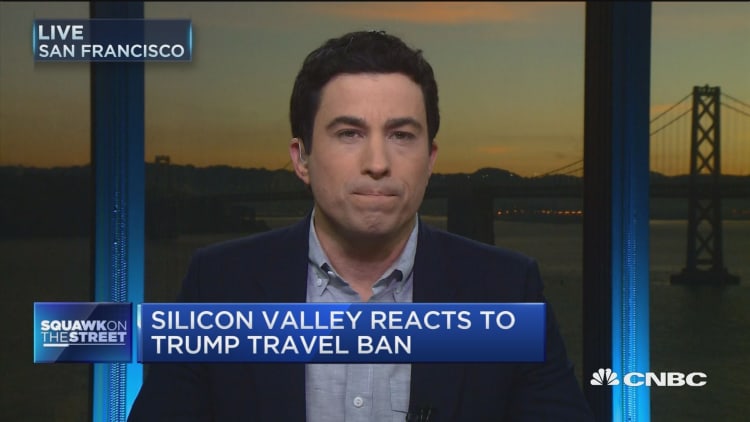After slamming Trump's actions and scrambling to protect their own employees, tech companies extended support to others impacted by President Trump's entry ban on noncitizens from seven predominantly Muslim countries, which remained in effect on Sunday.
Tech giants, start-ups and many of the industry's power players have pledged support for the American Civil Liberties Union, which has filed a lawsuit seeking to stop the order, and joined airport protesters in San Francisco and New York.
Immigrants are part of the industry's life blood. They have co-founded some of the Valley's most successful companies including Google, Facebook, eBay and Yahoo and make up a significant portion of the Valley's workforce. The National Foundation for American Policy, a nonpartisan think tank, found in March that immigrants had started more than half of the current crop of U.S start-ups whose values topped $1 billion.
Google co-founder and president of Alphabet Sergey Brin, who immigrated to the U.S. from the Soviet Union, joined protesters at San Francisco International Airport on Saturday night to show his personal support for refugees and immigrants and was snapped by Forbes writer Ryan Mac, whose tweet was widely shared.
Microsoft employees on Sunday urged each other on Twitter to take advantage of a reported offer by the tech giant to 100 percent match employee donations to the ACLU.
Ride-hailing company Lyft co-founders John Zimmer and Logan Green pledged to donate $1 million to the ACLU over the next four years "to defend our constitution," they said in a blog post Sunday.
The company's New York City general manager Vipul Patel joined demonstrators at John F. Kennedy International Airport on Saturday night. At its peak, the JFK protest lined both sides of the passenger pickup lane at Terminal 4 and united travelers and drivers alike, he told CNBC said via email.
"Civil liberties matter to us a great deal," he wrote.
Patel is a former lawyer and first-generation immigrant and rarely participates in public protests, he wrote. He joined the Women's March in Washington last week, his first march in over a decade, and joined a Manhattan rally on Sunday. The issues at stake matter to him both personally and professionally, he told CNBC.
"Our driver base in New York City is largely composed of immigrants, many of them Muslim," wrote Patel. "I want to stand with them in whatever way I can."
Stewart Butterfield, chief executive officer of workplace app Slack, and investor Chris Sacca of Lowercase Capital were among a number of tech leaders matching individual donations to the ACLU. Tweet.
Sacca, who in a December Recode story loudly criticized leaders from tech's biggest companies for meeting with the president, tweeted that he could barely keep up with the response and continued to increase the amount he said he would donate.
Airbnb CEO Brian Chesky, in a tweet and Facebook post Saturday night, said the home-sharing company would use its 3 million listings to help provide free housing to refugees and anyone outside their home country who is denied entry to the U.S.
"Not allowing countries or refugees into America is not right, and we must stand with those who are affected," Chesky wrote on Facebook.



